You are using an out of date browser. It may not display this or other websites correctly.
You should upgrade or use an alternative browser.
You should upgrade or use an alternative browser.
TikTok is urging users to call Congress about a looming ban
- Thread starter bnew
- Start date
More options
Who Replied?The Prince of All Saiyans
Formerly Jisoo Stan & @Twitter
Rest
In
Piss

In
Piss

Wait are you talking to the youth or Congress?Fukk gun control, reparations, Gaza, marijuana legalization, housing...but don't take my TikTok
Fukk TikTok, shut it down and make kids go outside and do stuff, get a job.
Youth.Wait are you talking to the youth or Congress?
They mobilize for the dumbest shyt, and when they do it's superficial and virtue signaling.
Congress can go out and get real jobs too tho.
https://www.techdirt.com/2024/03/14...wont-do-shyt-to-deal-with-any-actual-threats/
Once More With Feeling: Banning TikTok Is Unconstitutional & Won’t Do shyt To Deal With Any Actual Threats
Overhypefrom the
Thu, Mar 14th 2024 09:26am - Mike MasnickOver the last few days, we’ve had a few posts about the latest attempt to ban TikTok in the US (and to people who say it’s only a divestiture bill: there is a ban in the language of the bill if ByteDance won’t divest).
Yesterday, unsurprisingly, the House voted overwhelmingly, 352 to 65, to pass that bill. The 15 Republicans and 50 Democrats who voted no make up an odd mix. You have some extreme Trump supporters, who probably are voting no because the boss man said so, and then a random assortment of Democrats, including a bunch from California. I thought Rep. Sara Jacobs from the San Diego area put out a particularly good statement on why this bill is so stupid:
As a member of both the House Armed Services and House Foreign Affairs Committees, I am keenly aware of the threat that PRC information operations can pose, especially as they relate to our elections. However, after reviewing the intelligence, I do not believe that this bill is the answer to those threats. Banning TikTok won’t protect Americans from targeted misinformation or misuse of their personal data, which American data brokers routinely sell and share. This is a blunt instrument for serious concerns, and if enacted, would mark a huge expansion of government power to ban apps in the future. Instead, we need comprehensive data privacy legislation, alongside thoughtful guardrails for social media platforms – whether those platforms are funded by companies in the PRC, Russia, Saudi Arabia, or the United States.
Taking this unprecedented step also undermines our reputation around the world. We can’t credibly hold other countries to one set of democratic values while giving ourselves a free pass to restrict freedom of speech. The United States has rightly criticized others for censorship and banning specific social media platforms in the past. Doing so ourselves now would tarnish our credibility when it matters most and trample on the civil liberties of 150 million Americans – a vast majority of whom are young Americans – who use TikTok for their livelihoods, news, communication, and entertainment. Ultimately, all Americans should have the freedom to decide for themselves how and where to express themselves and what information they want to consume.”
I think the second paragraph here is the key one. People keep saying “but they do the same to us.” That’s no excuse. We shouldn’t take a page from the Chinese censorship playbook and basically give them the moral high ground, combined with the ability to point to this move as justification for the shenanigans they’ve pulled in banning US companies from China.
Don’t let the authoritarians set the agenda. We should be better than that.
But also, her first paragraph is important as well. To date no one has shown an actual evidence of TikTok being dangerous. Instead, all that people will tell me is that there was some sort of classified briefing about it. From Rep. Jacobs’ statement we see that she was able to see that classified intel, and did not find it convincing at all.
I even find myself in rare agreement with Rep. Thomas Massie, who once blocked me on Twitter. He did so in response to me calling out his First Amendment violations in blocking people on Twitter (he eventually removed the block after the Knight First Amendment Institute sent him a letter on my behalf). Rep. Massie may have a somewhat conditional take on the First Amendment, but he correctly pointed out just how dangerous this bill would be:
The President will be given the power to ban WEB SITES, not just Apps. The person breaking the new law is deemed to be the U.S. (or offshore) INTERNET HOSTING SERVICE or App Store, not the “foreign adversary.”
Massie also pointed (as we did earlier this week) to the clearly lobbied-for (hi, Yelp lobbyists!) “exclusion” for review websites as proof that people know this law covers websites.
I stand by the point we’ve been making for multiple years now: banning TikTok is a stupid, performative, unconstitutional, authoritarian move that doesn’t do even the slightest bit to stop China from (1) getting data on Americans or (2) using propaganda to try to influence people (which are the two issues most frequently used to justify a ban).
Banning TikTok, rather than passing comprehensive federal privacy legislation, is nothing but xenophobic theater. China can (and does) already buy a ton of data on Americans because we refuse to pass any regulation regarding data brokers who make this data available (contrary to popular opinion, Facebook and Google don’t actually sell your data, but data brokers who collect it from lots of other sources do).
Meanwhile, there’s little to no evidence that China is “manipulating” sentiment with TikTok, and there’s even less evidence that it would be effective if they were trying to do so. Public sentiment in the US regarding China is reaching record lows, with the vast majority of Americans reasonably concerned about China’s role in the world. So if China is using TikTok to propagandize to Americans, it’s doing a shytty job of it.
The US has dealt with foreign propaganda for ages. And we don’t ban it. Part of free speech is that you have to deal with the fact that nonsense propaganda and disinformation exists. There are ways to deal with it and respond to it that don’t involve banning speech. It’s astounding to me how quickly people give up their principles out of a weird, xenophobic fear that somehow China has magic pixie dust hidden within TikTok to turn Americans’ brains to mush.
The Supreme Court has reviewed this kind of thing before and said that, no the US cannot ban foreign propaganda just because it’s scared of what that propaganda says. In that case, the government sought to restrict the delivery of “communist political propaganda” from outside the country. The court struck down the restriction on First Amendment grounds, stating that it was “a limitation on the unfettered exercise of the [recipient’s] First Amendment rights.”
As the court noted in that case, the setup of the law was “at war with the ‘uninhibited, robust, and wide-open’ debate and discussion that are contemplated by the First Amendment.”
In the US, we’re supposed to believe in freedom of speech, even if that freedom of speech comes in the form of “foreign communist propaganda.” If we survived that same foreign communist propaganda for decades in other forms, it seems like we can survive it coming from an app designed to highlight short videos of dance moves.
Again, we can pass data protection laws if we’re afraid of how the data is going to be used, because China doesn’t need TikTok to get that data. And we can counter Chinese propaganda. But part of doing so has to be not hiding it and acting like it’s so powerful that Americans are powerless against it. You counter it by showing how freedom can resist such efforts at manipulation.
I have no idea if the Senate will actually take up this bill, though there’s good reason to believe they will. However, such a ban would be a huge mistake, reflect poorly on American values, and show how quickly we’re willing to ignore the First Amendment on some misguided fear of a successful app from a foreign country.
Filed Under: data protection, privacy, sara jacobs, thomas massie, tiktok ban
Companies: bytedance, tiktok
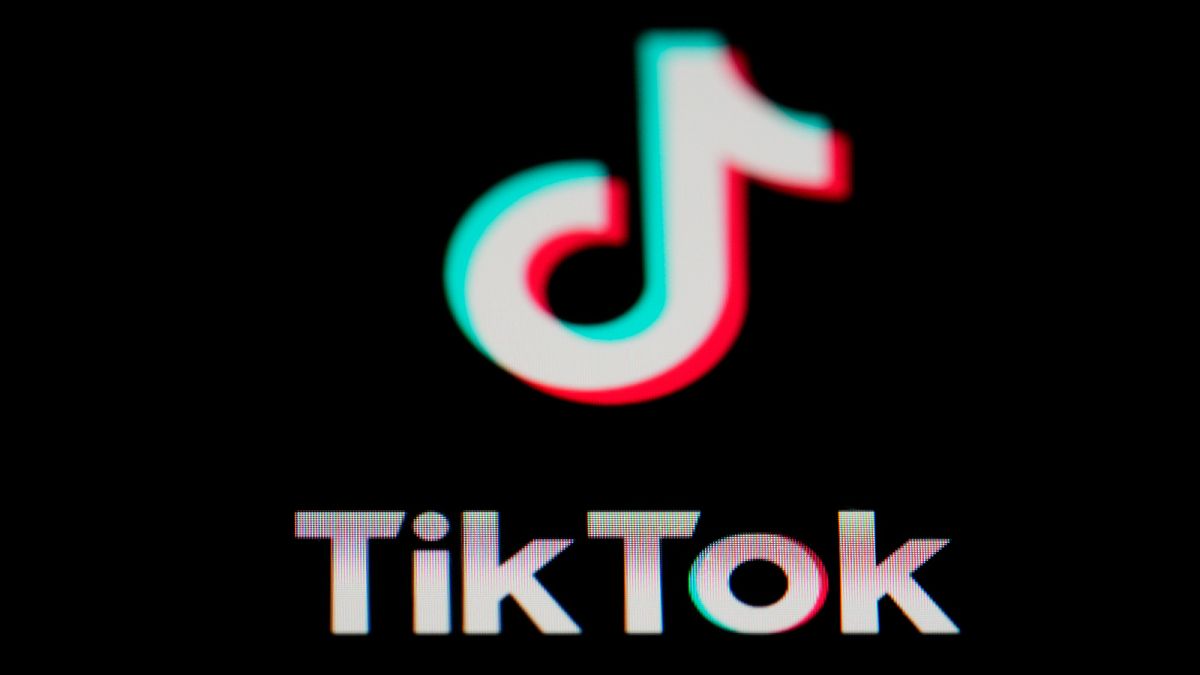
Lawmakers in Germany call for TikTok ban to be considered
Some German MPs on a parliamentary intelligence board think the country should consider a harder stance on TikTok.
Could Germany be the first in Europe to ban TikTok? Lawmakers call for debate following US vote

By Anna Desmarais
Published on 22/03/2024 - 09:31•Updated 09:31
Share this article Comments
Some German MPs on a parliamentary intelligence board think the country should consider a harder stance on TikTok.
German politicians are discussing whether they need to harden their stance on TikTok, a Chinese-owned social media app for short social media videos.
It comes a few days after the US House of Representatives voted unanimously in favour of legislation that could force ByteDance, the company behind TikTok, to sell the app or face a complete ban from app stores in the United States.
The bill still needs to be examined by the US Senate before it becomes law.
Multiple members of a German parliamentary board that monitors intelligence services have spoken recently about the topic.
Roderich Kiesewetter, vice chairman of the Bundestag’s intelligence control committee and member of Germany’s Christian Democratic Union (CDU), told German daily the Handelsblatt that the country should consider a "general ban on TikTok" if stricter regulation of the platform can’t be "implemented efficiently".
Some politicians in Germany consider the app "a danger to our democracy," Kiesewetter continued, because it is an "important instrument" in China and Russia’s hybrid warfare.
There are roughly 19 million users of TikTok in Germany, according to a 2023 government response tabled in the Bundestag.
Regulation instead of an outright ban
Jens Zimmerman, a member of Germany’s Social Democratic Party, said, according to German broadcaster BR, that the government should consider at least banning the app on federal devices. This is the case for the EU institutions, for instance.Others, like Ralf Stegner from Germany’s Social Democratic Party (SPD) and Konstantin von Notz, the deputy leader of Germany’s Green Party, said they would like to see how regulations will work instead of a full-out ban which can be hard to enforce.
By regulatory efforts, Stegner and von Notz are referring to the Digital Services Act (DSA).
The act, which came into effect this year, requires Internet companies to take consistent action to make sure disinformation and illegal content are not being spread on their platforms.
In February, the European Commission announced an investigation into TikTok under the DSA for breaches related to "the protection of minors, advertising transparency, data access as well as risk management of addictive design".
The Commission told Euronews Next in a statement that they have no comment about the ongoing TikTok ban bill in the United States, nor on talks in Germany.
- 'Matter of national security': Call to act on cyber violence against women after suicides in Albania
A Commission spokesperson said that decisions on IT security measures "lie with the relevant national authority".
The statement added that the DSA can as a last resort put in place a temporary "suspension or restriction of access of recipients to the service," if they don't comply with the legislation.
The suspension of TikTok on corporate devices is still in place, the Commission added.
AStrangeName
Member of Snitch Syndication
They are really forming like Voltron
Lawmakers in Germany call for TikTok ban to be considered
Some German MPs on a parliamentary intelligence board think the country should consider a harder stance on TikTok.www.euronews.com
Could Germany be the first in Europe to ban TikTok? Lawmakers call for debate following US vote

By Anna Desmarais
Published on 22/03/2024 - 09:31•Updated 09:31
Share this article Comments
Some German MPs on a parliamentary intelligence board think the country should consider a harder stance on TikTok.
German politicians are discussing whether they need to harden their stance on TikTok, a Chinese-owned social media app for short social media videos.
It comes a few days after the US House of Representatives voted unanimously in favour of legislation that could force ByteDance, the company behind TikTok, to sell the app or face a complete ban from app stores in the United States.
The bill still needs to be examined by the US Senate before it becomes law.
Multiple members of a German parliamentary board that monitors intelligence services have spoken recently about the topic.
Roderich Kiesewetter, vice chairman of the Bundestag’s intelligence control committee and member of Germany’s Christian Democratic Union (CDU), told German daily the Handelsblatt that the country should consider a "general ban on TikTok" if stricter regulation of the platform can’t be "implemented efficiently".
Some politicians in Germany consider the app "a danger to our democracy," Kiesewetter continued, because it is an "important instrument" in China and Russia’s hybrid warfare.
There are roughly 19 million users of TikTok in Germany, according to a 2023 government response tabled in the Bundestag.
Regulation instead of an outright ban
Jens Zimmerman, a member of Germany’s Social Democratic Party, said, according to German broadcaster BR, that the government should consider at least banning the app on federal devices. This is the case for the EU institutions, for instance.
Others, like Ralf Stegner from Germany’s Social Democratic Party (SPD) and Konstantin von Notz, the deputy leader of Germany’s Green Party, said they would like to see how regulations will work instead of a full-out ban which can be hard to enforce.
By regulatory efforts, Stegner and von Notz are referring to the Digital Services Act (DSA).
The act, which came into effect this year, requires Internet companies to take consistent action to make sure disinformation and illegal content are not being spread on their platforms.
In February, the European Commission announced an investigation into TikTok under the DSA for breaches related to "the protection of minors, advertising transparency, data access as well as risk management of addictive design".
The Commission told Euronews Next in a statement that they have no comment about the ongoing TikTok ban bill in the United States, nor on talks in Germany.
- 'Matter of national security': Call to act on cyber violence against women after suicides in Albania
A Commission spokesperson said that decisions on IT security measures "lie with the relevant national authority".
The statement added that the DSA can as a last resort put in place a temporary "suspension or restriction of access of recipients to the service," if they don't comply with the legislation.
The suspension of TikTok on corporate devices is still in place, the Commission added.


Instagram moves to limit political content
Instagram has moved to limit political content, with users now having to go into their settings on the app to turn the limiting feature off. Users of the popular social media platform now have to g…
Instagram moves to limit political content
BY TARA SUTER - 03/23/24 3:56 PM ET
Greg Nash
A download screen for Instagram is arranged for a photograph on Friday, August 19, 2022.
Instagram has moved to limit political content, with users now having to go into their settings on the app to turn the limiting feature off.
Users of the popular social media platform now have to go into their settings under “[c]ontent preferences,” click “[p]olitical content,” and choose the option to not “limit political content from people you don’t follow,” or else Instagram will limit political content from those the user doesn’t follow by default.
Instagram announced back in February that it would no longer proactively recommend political content.
“We want Instagram and Threads to be a great experience for everyone,” a post on Instagram’s blog from last month reads. “If you decide to follow accounts that post political content, we don’t want to get between you and their posts, but we also don’t want to proactively recommend political content from accounts you don’t follow.”
“So we’re extending our existing approach to how we treat political content – we won’t proactively recommend content about politics on recommendation surfaces across Instagram and Threads,” the Instagram blog post continues. “If you still want these posts recommended to you, you will have a control to see them.”
In a post from over a month ago on Threads, the head of Instagram, Adam Mosseri, said the mission of the policy change “is to preserve the ability for people to choose to interact with political content, while respecting each person’s appetite for it.”
Dani Lever, a spokesperson for Meta, the parent company of Instagram and Threads, said in an emailed statement to The Hill that the “change does not impact posts from accounts people choose to follow; it impacts what the system recommends, and people can control if they want more.”
“This announcement expands on years of work on how we approach and treat political content based on what people have told us they wanted,” Lever added. “And now, people are going to be able to control whether they would like to have these types of posts recommended to them.”
TAGS ADAM MOSSERI INSTAGRAM INSTAGRAM POLITICAL CONTENT META META POLITICAL CONTENT THREADS
1/3
this isn’t about TikTok, it’s about censorship. TikTok has become incredibly effective in educating the public on topics main news outlets won’t even cover.
It’s an accesible way for people to share crucial information in a digestible format. They want to censor that.
2/3
While you’re here!
3/3
It’s actually so worrying. My FYP will give me Palestinian voices, I just learned about the prison strikes, and there is so much generally good educational and call-to-action content on there. And you’re right. They can’t control it so they want to get rid of it.
this isn’t about TikTok, it’s about censorship. TikTok has become incredibly effective in educating the public on topics main news outlets won’t even cover.
It’s an accesible way for people to share crucial information in a digestible format. They want to censor that.
2/3
While you’re here!
3/3
It’s actually so worrying. My FYP will give me Palestinian voices, I just learned about the prison strikes, and there is so much generally good educational and call-to-action content on there. And you’re right. They can’t control it so they want to get rid of it.
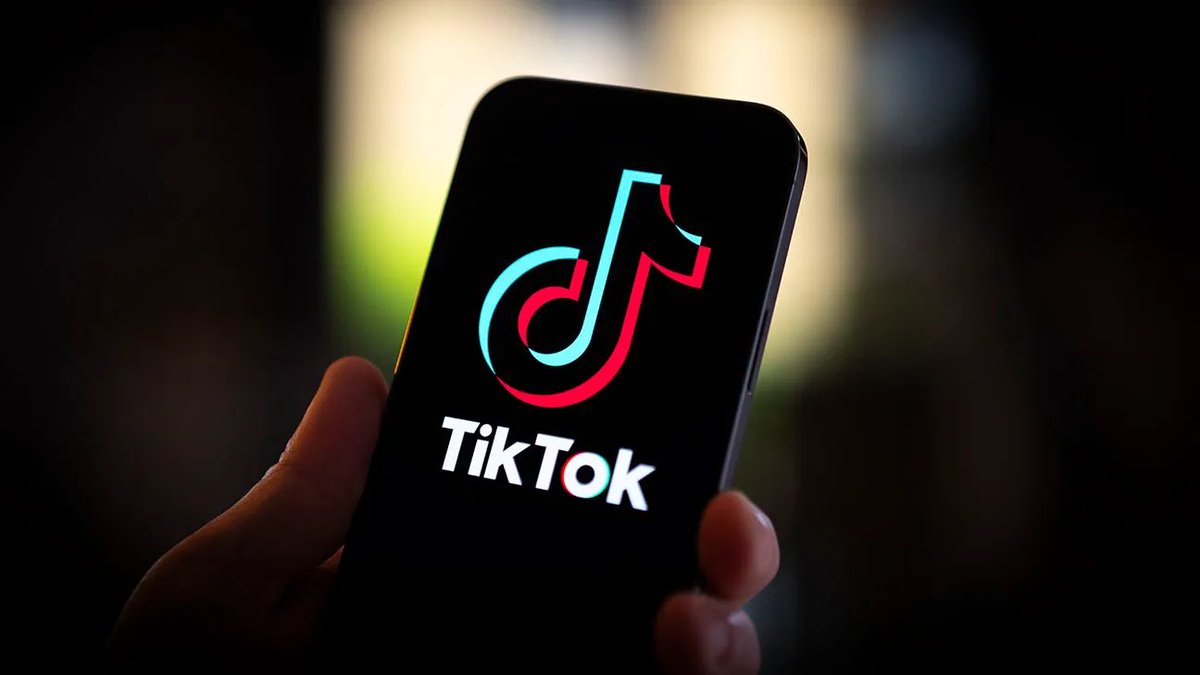
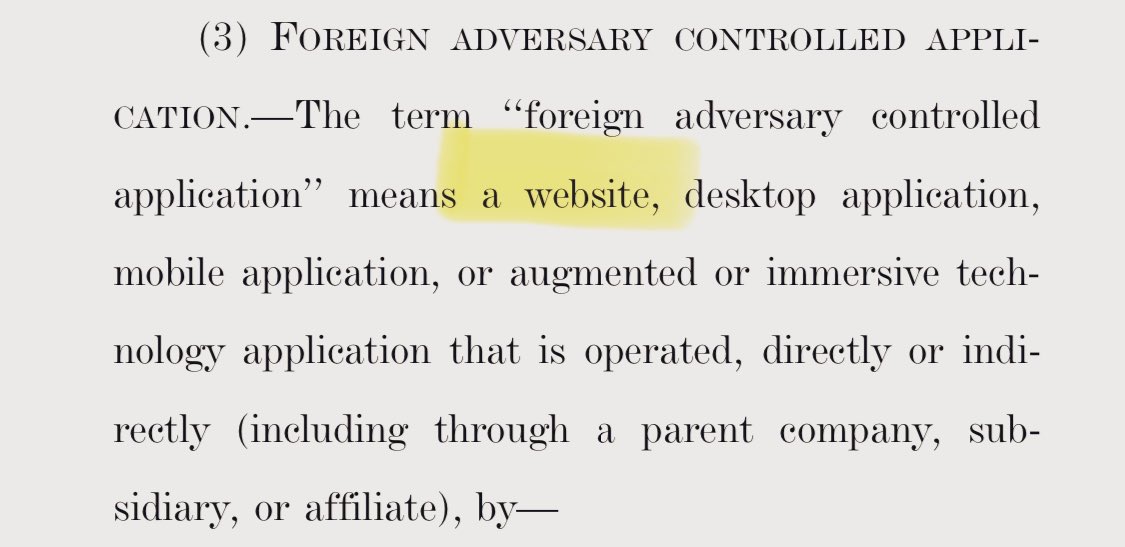

Some states are seeking to restrict TikTok. That doesn't mean their governors aren't using it
Efforts to ban TikTok from government devices have picked up steam in the past year in state legislatures and Congress even as politicians continue to use it to connect with and expand their base.
Some states are seeking to restrict TikTok. That doesn’t mean their governors aren’t using it
FILE - Pennsylvania Gov. Josh Shapiro arrives in Blue Bell, Pa., Friday, Jan. 5, 2024. Shapiro, a Democrat, is a prolific Tik Tok poster, with his efforts beginning on the campaign trail through a personal account. The first-termer is a rising star in the Democratic Party and among a handful of governors who are building their national profiles and possibly positioning themselves for a 2028 run for the White House. (AP Photo/Matt Rourke, File)
BY BROOKE SCHULTZ
Updated 12:06 AM EDT, April 6, 2024
Share
HARRISBURG, Pa. (AP) — POV: You’re on TikTok, and so is your governor — even as your Legislature considers banning the app from state-owned devices and networks.
Efforts to ban TikTok over security concerns about China’s influence through the platform have picked up steam in the past year in state legislatures, with an expansive ban even proposed by Congress. In Pennsylvania, forward movement on a bill that first unanimously passed the state Senate last year could send legislation to the Democratic governor’s desk imminently.
But even as the app faces scrutiny and bans, governors and state agencies — and even President Joe Biden — are still using the app to promote their initiatives and expand their voting pool. Their target is the youth vote, or the people who largely make up the app’s U.S. user base of 170 million.
Pennsylvania Gov. Josh Shapiro, a Democrat, is a prolific poster, with his efforts beginning on the campaign trail through a personal account. The first-termer is a rising star in the Democratic Party and is among governors building national profiles and possibly positioning themselves for a 2028 run for the White House.
His careful messaging extends to his official governor account on TikTok. All colored with his priorities and stances, videos have him participating in viral trends, breaking down aspects of his budget proposal, and even taking a dig at Texas via a Beyoncé song.
Other governors use TikTok accounts — among verified accounts, only Democrats — even in states that have banned the app from state devices and networks.
It isn’t surprising that politicians do use TikTok so much, said Anupam Chander, visiting scholar at the Institute for Rebooting Social Media at Harvard University. It’s more surprising that they don’t.
Such outreach draws its lineage to President Franklin Roosevelt’s fireside chats, when Depression-era Americans would gather around the radio to hear his voice. More recently, social media has been galvanized in elections, like former President Barack Obama on Facebook in 2008, or former President Donald Trump on Twitter, now X, in 2016.
“This is an app that can be very personal. You can share your walk to the Senate chambers or your exhilaration as a vote is passed. Or your disappointment when a vote fails,” he said. “This is a way to reach people in a very personal way.”
Former GOP presidential candidate Vivek Ramaswamy made early and, well, liberal use of TikTok during his campaign, with one young Republican saying his social media presence “made him popular.”
“A lot of younger voters seem receptive to candidates such as Ramaswamy, due to his young age and new-generation agenda,” Victoria Carlson, a spokesperson for the George Washington University College Republicans, told CBS News in September.
In Michigan, the app was banned in March 2023 from government devices — with certain exceptions, like Democratic Gov. Gretchen Whitmer’s promotional account, which has brought cute dog videos, her March Madness bracket and news about her initiatives to her roughly 245,000 followers.
In New Jersey, a government-affiliated app posts jokes and memes. An exemption in New Jersey’s law banning TikTok from government devices allows for posts from non-state networks, with permission. Other government accounts across the country have touted their state parks to drive tourism, events and small businesses.
In Pennsylvania, you have Shapiro and his steaming ‘Get S—t Done’ mug of tea — a nod to his edgy tagline — or slightly shaky footage as he records himself thanking teachers as his kids head back to school. As a play on the popular “point of view” videos where creators set up a scenario, Shapiro makes a concerned face with the overlaid text “POV: When extremists try to stop legal votes from counting.”
“The governor believes, and this administration believes, that there should be no wrong door to accessing government,” said Manuel Bonder, Shapiro’s spokesperson.
TikTok is part of that landscape, he said. The administration has a phone dedicated only to making TikToks, off of state Wi-Fi, with no other apps on it, Bonder said.
A TikTok spokesperson wouldn’t be quoted by name about legislation banning the app.
In 2022, researchers found more than 100 accounts for those running for Congress. A majority were Democrats, said Maggie Macdonald, assistant professor of political science at the University of Kentucky.
“It seems to be, Democrats are exclusively having this debate, in terms of having an account and talking of banning it,” she said.
1/2
The tiktok ban will most likely pass today. Here are some things you can do & follow
@vitusspehar for more
2/2
Here if you want to sign
To post tweets in this format, more info here: https://www.thecoli.com/threads/tips-and-tricks-for-posting-the-coli-megathread.984734/post-52211196
The tiktok ban will most likely pass today. Here are some things you can do & follow
@vitusspehar for more
2/2
Here if you want to sign
To post tweets in this format, more info here: https://www.thecoli.com/threads/tips-and-tricks-for-posting-the-coli-megathread.984734/post-52211196
1/1
BREAKING: The House just passed the bill to ban TikTok in the U.S.
It's likely to pass in the Senate since it's tied to more war funds for the U.S. proxy war in Ukraine and for Israel.
Why the pro-Israel lobby is pushing the ban:
To post tweets in this format, more info here: https://www.thecoli.com/threads/tips-and-tricks-for-posting-the-coli-megathread.984734/post-52211196
BREAKING: The House just passed the bill to ban TikTok in the U.S.
It's likely to pass in the Senate since it's tied to more war funds for the U.S. proxy war in Ukraine and for Israel.
Why the pro-Israel lobby is pushing the ban:
To post tweets in this format, more info here: https://www.thecoli.com/threads/tips-and-tricks-for-posting-the-coli-megathread.984734/post-52211196
1/2
A ban on TikTok in the United States is once again back on the chopping block this year as the House of Reps pass a new bill that would ban the popular video sharing app. U.S. House of Reps Pass New Bill That Bundles TikTok Ban and Foreign Aid - IGN
2/2
A Joker open-world game concept created in Unreal Engine 5 by @teaserplayz
To post tweets in this format, more info here: https://www.thecoli.com/threads/tips-and-tricks-for-posting-the-coli-megathread.984734/post-52211196
A ban on TikTok in the United States is once again back on the chopping block this year as the House of Reps pass a new bill that would ban the popular video sharing app. U.S. House of Reps Pass New Bill That Bundles TikTok Ban and Foreign Aid - IGN
2/2
A Joker open-world game concept created in Unreal Engine 5 by @teaserplayz
To post tweets in this format, more info here: https://www.thecoli.com/threads/tips-and-tricks-for-posting-the-coli-megathread.984734/post-52211196
1/1
Biden has promised to sign the TikTok ban by midnight Saturday. TikTok creators are meeting in DC to make their voices heard.
When your govt moves to deny you liberty you make your voices heard all the way to DC! Meet us Saturday at the Capital at 11:30 AM to PEACEFULLY meet members of Congress & make our voices heard for Free Speech! We need to remind our reps that our speech isnt a bargaining chip in their forever wars. @UnderTheDeskNews
@Cancelcloco
@midroadsanity
To post tweets in this format, more info here: https://www.thecoli.com/threads/tips-and-tricks-for-posting-the-coli-megathread.984734/post-52211196
Biden has promised to sign the TikTok ban by midnight Saturday. TikTok creators are meeting in DC to make their voices heard.
When your govt moves to deny you liberty you make your voices heard all the way to DC! Meet us Saturday at the Capital at 11:30 AM to PEACEFULLY meet members of Congress & make our voices heard for Free Speech! We need to remind our reps that our speech isnt a bargaining chip in their forever wars. @UnderTheDeskNews
@Cancelcloco
@midroadsanity
To post tweets in this format, more info here: https://www.thecoli.com/threads/tips-and-tricks-for-posting-the-coli-megathread.984734/post-52211196
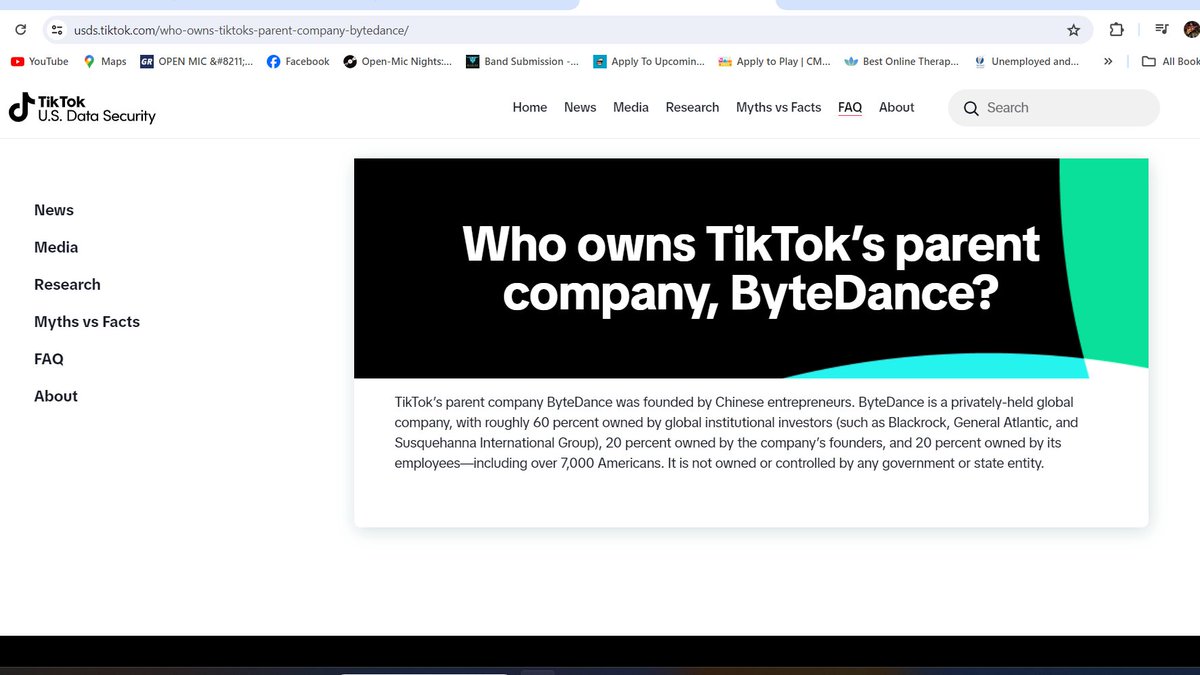
1/2
TikTok Ban is a hoax.
We know who's behind it.
2/2
Hint:
To post tweets in this format, more info here: https://www.thecoli.com/threads/tips-and-tricks-for-posting-the-coli-megathread.984734/post-52211196
TikTok Ban is a hoax.
We know who's behind it.
2/2
Hint:
To post tweets in this format, more info here: https://www.thecoli.com/threads/tips-and-tricks-for-posting-the-coli-megathread.984734/post-52211196
1/1
Solid rant.
I’m curious to see what happens too if they ban TikTok.
The politicians aren’t going to ban it for “national security” interests. It’s to silence dissent.
To post tweets in this format, more info here: https://www.thecoli.com/threads/tips-and-tricks-for-posting-the-coli-megathread.984734/post-52211196
Solid rant.
I’m curious to see what happens too if they ban TikTok.
The politicians aren’t going to ban it for “national security” interests. It’s to silence dissent.
To post tweets in this format, more info here: https://www.thecoli.com/threads/tips-and-tricks-for-posting-the-coli-megathread.984734/post-52211196
1/1
TikTok CEO Shou Chew responds to the bill that could ban the app: “Make no mistake, this is a ban, a ban of TikTok and a ban on you and your voice.”
“Rest assured, we aren’t going anywhere.”
To post tweets in this format, more info here: https://www.thecoli.com/threads/tips-and-tricks-for-posting-the-coli-megathread.984734/post-52211196
TikTok CEO Shou Chew responds to the bill that could ban the app: “Make no mistake, this is a ban, a ban of TikTok and a ban on you and your voice.”
“Rest assured, we aren’t going anywhere.”
To post tweets in this format, more info here: https://www.thecoli.com/threads/tips-and-tricks-for-posting-the-coli-megathread.984734/post-52211196
TikTok CEO expects to defeat US ban: 'We aren't going anywhere'
By David ShepardsonApril 24, 20245:44 PM EDTUpdated 5 hours ago
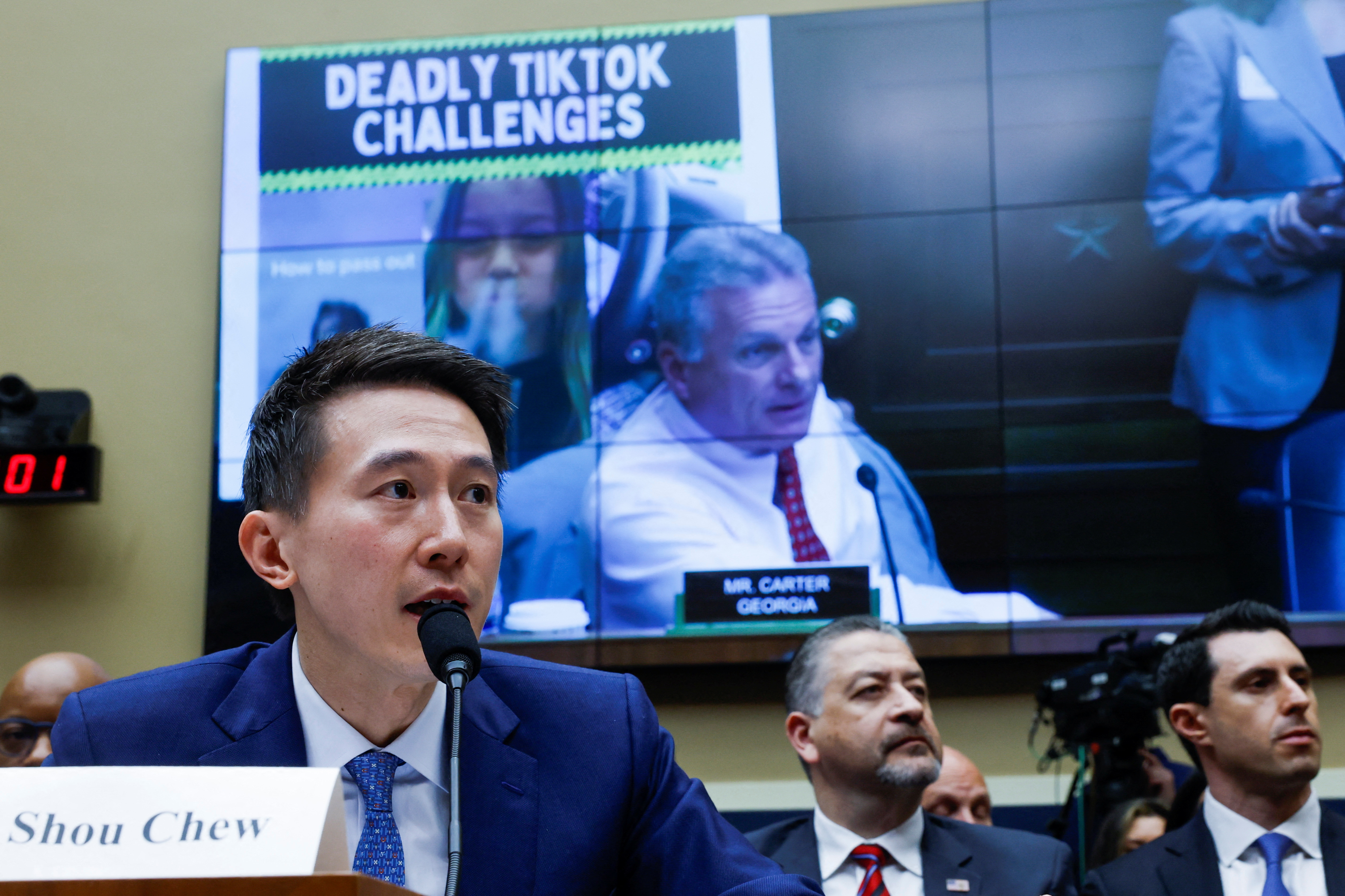
Item 1 of 3 REUTERS/Evelyn Hockstein
[1/3]REUTERS/Evelyn Hockstein Purchase Licensing Rights, opens new tab
- Companies
- Alphabet Inc
Apple Inc
Meta Platforms Inc
Show more companies
WASHINGTON, April 24 (Reuters) - TikTok's chief executive said on Wednesday the social media company expects to win a legal challenge to block legislation signed into law by President Joe Biden that he said would ban its popular short video app used by 170 million Americans.
"Rest assured - we aren't going anywhere," CEO Shou Zi Chew said in a video posted moments after Biden signed the bill that gives China-based ByteDance 270 days to divest TikTok's U.S. assets or face a ban. "The facts and the Constitution are on our side and we expect to prevail again."
Biden's signing sets a Jan. 19 deadline for a sale - one day before his term is set to expire - but he could extend the deadline by three months if he determines ByteDance is making progress. Biden is seeking a second term against former President Donald Trump.
"We don't want to see a ban," White House spokeswoman Karine Jean-Pierre said on Tuesday. "This is about PRC ownership," she added, referring to the People's Republic of China.
In 2020, Trump was blocked by the courts in his bid to ban TikTok and Chinese-owned WeChat, a unit of Tencent (0700.HK), opens new tab, in the United States. Trump, the Republican presidential candidate, has reversed course and said on Monday that Biden was "pushing" for a ban on TikTok and would be the one responsible if a ban were imposed, urging voters to take notice.
"Make no mistake - this is a ban on TikTok," Chew said, emphasizing that TikTok would continue to operate as the company challenges the restrictions.
Many experts question if any potential buyer has the financial resources to buy TikTok and if China and U.S. government agencies would approve a sale.
Driven by widespread worries among U.S. lawmakers that China could access Americans' data or surveil them with the app, the bill was overwhelmingly passed late on Tuesday by the U.S. Senate. The U.S. House of Representatives approved it on Saturday.
The four-year battle over TikTok is a significant front in a war over the internet and technology between Washington and Beijing. Last week, Apple (AAPL.O), opens new tab said China had ordered it to remove Meta Platforms' (META.O), opens new tab WhatsApp and Threads from its App Store in China over Chinese national security concerns.
TikTok is set to challenge the bill on First Amendment grounds and TikTok users are expected to again take legal action. A U.S. judge in Montana in November blocked a state ban on TikTok, citing free-speech grounds.
The American Civil Liberties Union said banning or requiring divestiture of TikTok would "set an alarming global precedent for excessive government control over social media platforms."
However, the new legislation is likely to give the Biden administration a stronger legal footing to ban TikTok if ByteDance fails to divest the app, experts say.
If ByteDance failed to divest TikTok, app stores operated by Apple, Alphabet's (GOOGL.O), opens new tab Google and others could not legally offer TikTok or provide Web hosting services to ByteDance-controlled applications or TikTok's website.
Senator Laphonza Butler, a California Democrat, urged the White House to consider the fate of 8,000 U.S. employees of TikTok, many of whom are in New York or California.
"We must acknowledge the impact on TikTok workers, and our local economies, as we determine a path forward," Butler told Biden in a letter.
The bill would also give the White House new tools to ban or force the sale of other foreign-owned apps it deems to be security threats.
Democratic Senator Ron Wyden said he was concerned the bill "provides broad authority that could be abused by a future administration to violate Americans' First Amendment rights."
Biden's re-election campaign plans to continue using TikTok, a campaign official said on Wednesday. Trump's campaign has not joined TikTok.
Biden signed legislation in late 2022 that barred U.S. government employees from using TikTok on government phones.
The Technology Roundup newsletter brings the latest news and trends straight to your inbox. Sign up here.
Reporting by David Shepardson in Washington; Editing by Chizu Nomiyama, Matthew Lewis and Emelia Sithole-Matarise and Richard Chang
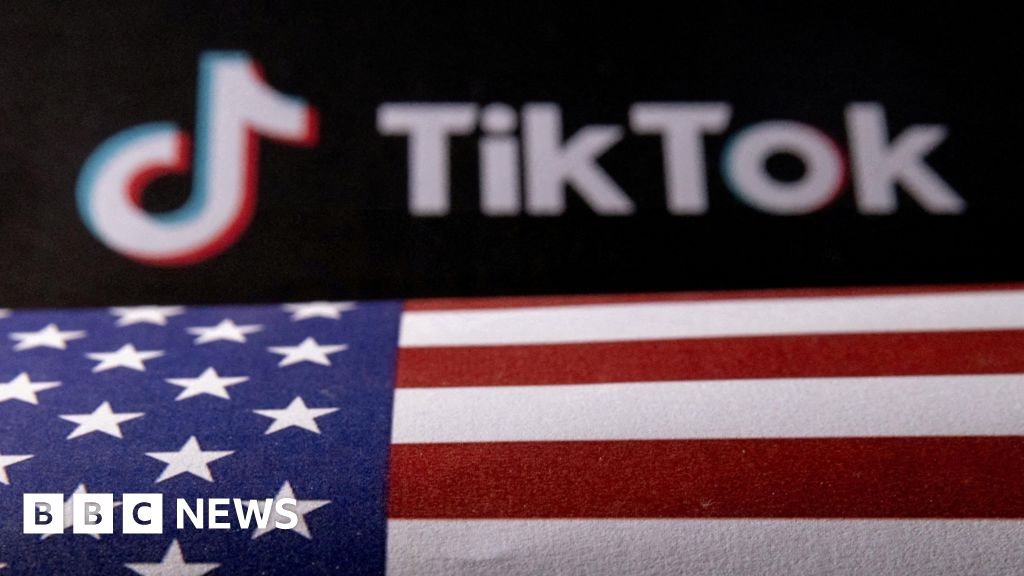
TikTok will not be sold, Chinese parent ByteDance tells US
The video sharing app faces being banned in the US unless it severs ties with its China's ByteDance.
www.bbc.com
TikTok will not be sold, Chinese parent tells US

IMAGE SOURCE,REUTERS
Image caption,ByteDance says a report it plans to sell TikTok "are not true"Article information
- Author,João da Silva
- Role,Business reporter
- 26 April 2024
TikTok's Chinese parent company ByteDance says it has no intention of selling the business after the US passed a law to force it to sell the hugely popular video app or be banned in America.
"ByteDance doesn't have any plans to sell TikTok," the company posted on its official account on Toutiao, a social media platform it owns.
TikTok did not immediately respond to a request for comment from the BBC.
Earlier this week, TikTok said it would challenge in court the "unconstitutional" law.
The statement from ByteDance came in response to an article by the technology industry website The Information that said it was exploring the potential sale of TikTok’s operation in the US without the algorithm that powers it.
"Foreign media reports of ByteDance selling TikTok are not true," the company said in the post, which included a screen shot of the article with the Chinese characters meaning "false rumour" stamped on it.
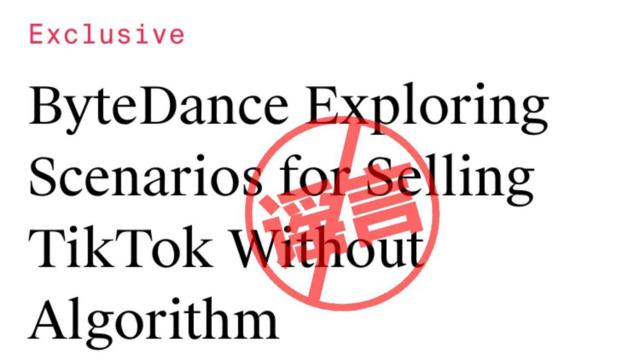
IMAGE SOURCE,BYTEDANCE
Image caption,ByteDance denied the report on a social media site it owns
The sell-or-ban measure was signed into law by US President Joe Biden on Wednesday.
Beijing's tightening grip on private companies has raised concerns in the US, and other Western countries, about how much control the Chinese Communist Party has over ByteDance, and the data it holds.
TikTok has repeatedly denied claims the Chinese government has control over ByteDance.
"We are confident and we will keep fighting for your rights in the courts," said TikTok boss Shou Zi Chew in a video posted on the platform this week.
"The facts, and the Constitution, are on our side... rest assured, we aren't going anywhere."
According to TikTok, ByteDance's Chinese founder owns 20% of shares, through a controlling stake in the company.
About 60% is owned by institutional investors, including major US investment firms Carlyle Group, General Atlantic, and Susquehanna International Group.
The remaining 20% is owned by its employees around the world and three of ByteDance's five board members are American.
The Chinese government has also dismissed such concerns as paranoia and has warned that a TikTok ban would "inevitably come back to bite the US".
However, TikTok is not facing an immediate ban in the US.
The new law gives ByteDance nine months to sell the business, and an additional three-month grace period, before a potential ban can be enforced.
That means the sale deadline would most likely come some time in 2025, after the winner of the 2024 presidential election takes office.
